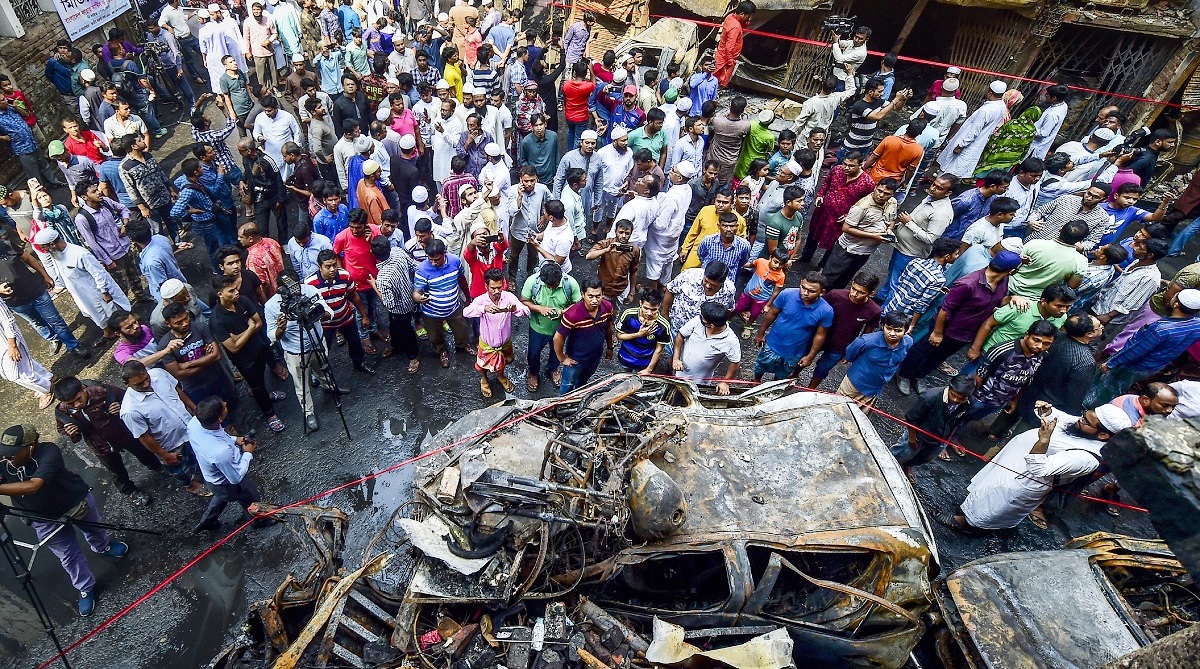Cong defeated ‘Bangladesh’ in semis, will rout ‘Pakistan’ in finals: Reddy
Reddy was addressing a meeting of the Congress social media team and took digs at both the BJP and the BRS.
Only after the death of 80 people has the national government, helmed by Sheikh Hasina, ordered all chemical factories in the Old City to be closed.

Bangladeshi people gather around the wreckage of cars that burnt in a fire in Dhaka, Bangladesh's capital city, on February 22, 2019. Funerals started on February 22 for victims of a devastating fire in a historic district of Dhaka that killed almost 70 people burned alive by exploding chemical canisters and trapped by flames. (MUNIR UZ ZAMAN / AFP)
Heartrending as the visuals are, the sight of relatives carrying coffins of the 80 people who perished in Thursday’s fire in a chemical store in “Outer Dhaka” revives memories of the catastrophe in the garment industry and the collapse of Rana Plaza in April 2013. The accident has almost immediately raised the question of the rapid spread of illegalities. In trying to be wise after the event, the authorities have resolved to relocate, if not bring the shutters down on the illegal chemical stores. For far too long have the owners played with fire and literally so, with the irregularities being tacitly condoned by the party in power. This is the thread that runs from the garment factories, that cater to an international clientele, to the chemical stores. The devastation was so severe indeed that the blaze raged for 12 hours overnight, spreading through four tenements in the city’s old quarter, including several that were being used as chemical warehouses and perfume factories. The fire was accelerated by highly-combustible stores of chemicals, perfumes and plastic granules. The number of bodybags can only be a matter of gruesome statistic; the thought that must be uppermost in Bangladesh today is the negligent nonchalance of both industry and government. It may be tempting, therefore, to draw a parallel with recent fires in Delhi and Kolkata… callous indifference being the striking feature on either side of the border. That the accident occurred on February 21 ~ International Mother Language Day in Bangladesh ~ has deepened the enormity of the tragedy. Though there is no link between a devastating fire and Language Day on the face of it, the occasion has had an emotive connotation ever since the heady days of Partition, not to forget the events of 1971 when the East charted its own course. The rest is history.
Yet history has not been particularly kind to Bangladesh these past 48 years. Only after the death of 80 people has the national government, helmed by Sheikh Hasina, ordered all chemical factories in the Old City to be closed. It would be useful to recall that the government had pledged to do the same after a fire in the area nine years ago had killed more than 120 people. Not that the factories have not been periodically raided to ensure that the rules of engagement are being followed; but such efforts have never been suitably sustained to have an impact on the industry. Feeble has been the response to a fearsome challenge. There are an estimated 1,000 chemical factories in the Old City, 850 of which are illegal, according to the Bangladeshi environmentalist group Poribesh Bachao Andolon (Poba). Neither the administration nor the city corporation have followed the guidelines of urban planners. Poor enforcement of safety regulations has rendered the Old City vulnerable to deadly disasters. The fire exemplifies the grot of Dhaka.
Advertisement
Advertisement